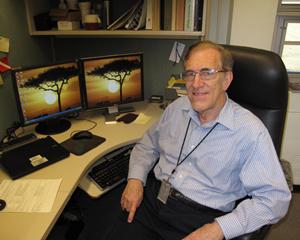Meet EPA Scientist Richard Zepp, Ph.D.

EPA Senior Research Scientist Dr. Richard Zepp's research interests include nanomaterials (a class of small-scale substances less than 100 nanometers in size) transformation in the environment, keeping recreational waters safe, and how climate change might affect ecosystems.
Dr. Zepp is an Adjunct Professor at the Rosenstiel School of Marine and Atmospheric Sciences, University of Miami, Florida and at the State University of New York, Syracuse (Department of Chemistry). Since 1995, he has been a member of the United Nations Environment Programme Panel on Environmental Effects of Ozone Depletion.
How does your science matter?
I study nanomaterials, such as carbon nanotubes and nanosilver, which are used in a wide variety of consumer products to do things such as make them stronger, conduct electricity or disinfect bacteria. At EPA, we’re interested in the persistence of these materials in the environment and how they interact and change over time. The release of these materials from plastics and coatings is one area where I have focused my research. This information will help us predict how humans and other organisms could be exposed to these chemicals.
I also research pathogen indicators, which are organisms EPA uses to track biological contamination in recreational water, like enterococci or E. coli. We’ve developed a software program called Virtual Beach that looks at local environmental conditions and predicts contamination problems before they happen. This helps state and local managers advise the public if a beach shouldn’t be used on that day because of contamination. Contributing to the development of this project was really gratifying because it’s being used in many parts of the United States to protect public health.
- Nanomaterials Research
- Virtual Beach - Modeling tool helps beach managers protect swimmer's health
If you could have dinner with any scientist, past or present, who would you choose and what would you like to ask them?
I would say Galileo. He’s often been called the father of modern science and was one of the architects of the scientific method. He went against what was commonly accepted in his day and really believed in what he worked on.
Another would be an Italian scientist, Giacomo Ciamician, who conducted pioneering research on the chemical effects of light exposure and was one of the first to recognize that the release of fossil-derived carbon into the atmosphere was going to cause some big problems.
I’d like to ask them, “How did you become so interested in these broader issues?” Sometimes it’s hard to break out of a smaller discipline and broaden yourself into other types of activities, but these guys were both capable of doing that.
What do you like most about your research?
My work provides an opportunity to conduct both laboratory and field studies, which is unique because in most research jobs you focus on one or the other. Another thing I enjoy about the job is communicating the research and having interactions with people who are using the research. It’s very gratifying to see people are using your research to solve existing problems.

When did you first know you wanted to be a scientist?
When I was in fifth grade, I had an outstanding teacher. He did all kinds of hands-on experiments in the classroom. In one particular experiment, he separated the class into three groups where one group washed their hands with soap and water, one group washed their hands with just water, and one did nothing. The group who only washed their hands with water had by far, the most bacteria on their hands. The water just mobilized the bacteria off of their fingers. Those experiences really got me interested in science.
If you weren’t a scientist, what would you be doing?
I’d probably be a medical researcher. I know it’s still pretty scientific, but I’d probably do medical research on interactions with light and human health.
Tell us about your background.
I did my undergraduate studies at Furman University and received a Bachelors degree in chemistry. I got a Ph.D. in organic chemistry at Florida State University in Tallahassee and participated in postdoctoral research at Michigan State University.
Any advice for students interested in a career in science?
I can think of no other more interesting and rewarding occupation than scientific research, especially in environmental science. Environmental sciences provide many opportunities for contributing solutions to major societal problems. Once you understand interactions between humans and the environment, you’re in a better position to understand how human activities can be brought into harmony with the environment.
I think students that are interested in this type of work should try to get involved by working on a project in a research lab. I think that’s the best way to get your feet wet, either in high school or college. Look for something going on near you this summer.
Editor's Note: The opinions expressed herein are those of the researcher alone. EPA does not endorse the opinions or positions expressed.
